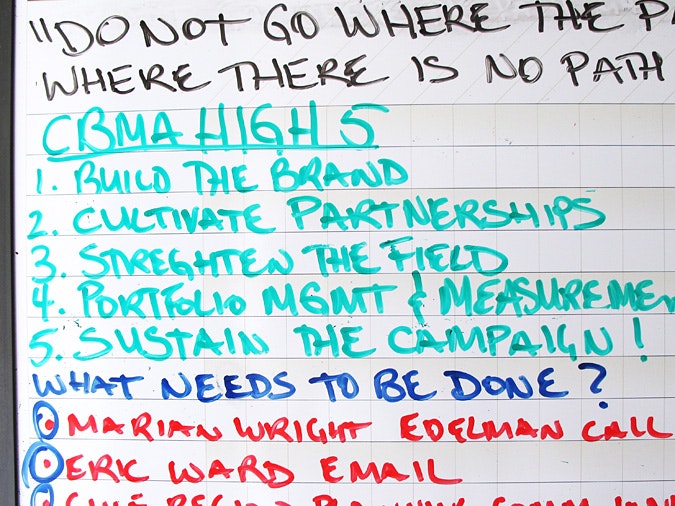The Focus Factor
By Shawn Dove

Managing a high-profile philanthropic initiative at the Open Society Foundations has demanded increased leadership capacity in areas like vision, resiliency, collaboration, strategic planning, and team-building, yet all of those leadership principles are not as effective without understanding and practicing the "focus factor."
“Focus, focus, focus,” were the final words Michele Cahill drilled into my head in a mentoring session during my first few months after landing at the Open Society Foundations to launch the Campaign for Black Male Achievement. Meeting with Cahill, a vice president for the Carnegie Corporation of New York, was just one of several early listening and learning tour stops during the very beginning of my tenure as manager of the campaign, yet her “focus, focus, focus” mantra has emerged as the most salient message that has echoed through my mind over the past two years.
The Campaign for Black Male Achievement was launched in 2008 to improve the life outcomes of black men and boys, countering the mounting disparities and barriers they face in the areas of educational equity, work opportunities, and family supports. Cahill’s advice was foreshadowed the day after the campaign went public, when the deluge of phone calls and emails made it clear to me that the demand for resources to support black males in America far exceeded the supply of our grantmaking budget.
Our strategic planning process further personified Cahill’s message, as the campaign team had to meet the challenge of figuring out how to get the most impact out of limited financial resources over what was at the time a three-year initiative. So we decided we should focus the geography of our grantmaking and emerged with three core investment regions: Mid-Atlantic (Baltimore, MD, and Philadelphia, PA), Midwest (Chicago, IL, and Milwaukee, WI), and the Gulf Region (New Orleans, LA, and Jackson, MS).
The "focus factor" continued to prevail during the strategic planning process, when we were led to narrow down our investment priorities to the following core areas: education, work, family, and strengthening the field of black male achievement. Yes, there are a host of other worthy areas our campaign could have invested in, like health, but being disciplined with our strategic focus sure comes in handy when Rashid Shabazz, program officer for the campaign, and I face the daily deluge of requests to support great projects outside of our grantmaking focus. The focus factor gives us a sound rationale for declining to invest in all the worthwhile opportunities that come across our desks. Otherwise we’d be tempted to sprinkle seemingly random grants all across the country, creating a campaign that was many miles wide for sure, but only inches deep!
Reggie Moore, founder of the Urban Underground in Milwaukee and one of our grantee partners, highlights the power of focus in his personal leadership journey. “I have learned the importance of filtering as a method of focus,” said Moore. “We must watch what we allow to consume our time, energy, attention, and spirit. We must filter out the things that distract from our purpose or weaken our spirits; and focus on the things that make us strong, productive, and effective.”
Rashid Shabazz also highlights the importance of focus in order to be an effective leader: “The most important characteristic beyond the relationships one shares is the ability to focus. In order to meet goals and not be deterred by growing demands, agendas, and outside distractions, a leader’s ability to focus on completing goals and objectives—to listen to the quiet voice within—is the most essential trait for organizational leadership.”
In their book Power of 2: How to Make the Most of Your Partnerships at Work and in Life, authors Rodd Wagner and Gale Muller hit the focus factor bulls-eye when they assert, “the pressure to be all things to all people is pervasive. But doing just a few things exceptionally well is a better path to success than spreading yourself thinly across dozens of disciplines, becoming, as they say in Spanish aprendiz de todo, maestro de nada (apprentice of everything, master of nothing).”
In my quest to effectively lead and manage the campaign, I’ve established what I call my High 5 Focus Points: five critical areas where I believe if I focus most of my time and energy the campaign strategy will succeed. These points, which are perpetually posted on the whiteboard in my office, are:
- Building the Brand of Black Male Achievement: Focusing on keeping the crisis of black males central to the national philanthropic, political, and public policy conversation;
- Cultivating Philanthropic Partnerships (outside and inside of the Open Society Foundations): Focusing on opportunities to leverage additional resources for the field of black male achievement;
- Strengthening the Field: Focusing on developing organizational leadership, capacity and sustainability;
- Portfolio Management and Measurement: Focusing on relationships with grantee partners and promoting the impact of their work;
- Sustaining the Campaign: Focusing on keeping this important work alive both inside the Open Society Foundations and in the field of philanthropy.
Sure, we have a set of goals and strategies detailed in the Campaign for Black Male Achievement's plan of which I am forever mindful, but somewhere along the line I figured out that if I focus intently on my High 5 Focus Points, the campaign will be well-positioned to achieve its mission to improve the life outcomes of black men and boys.
Until February 2015, Shawn Dove was manager of the Open Society Campaign for Black Male Achievement.